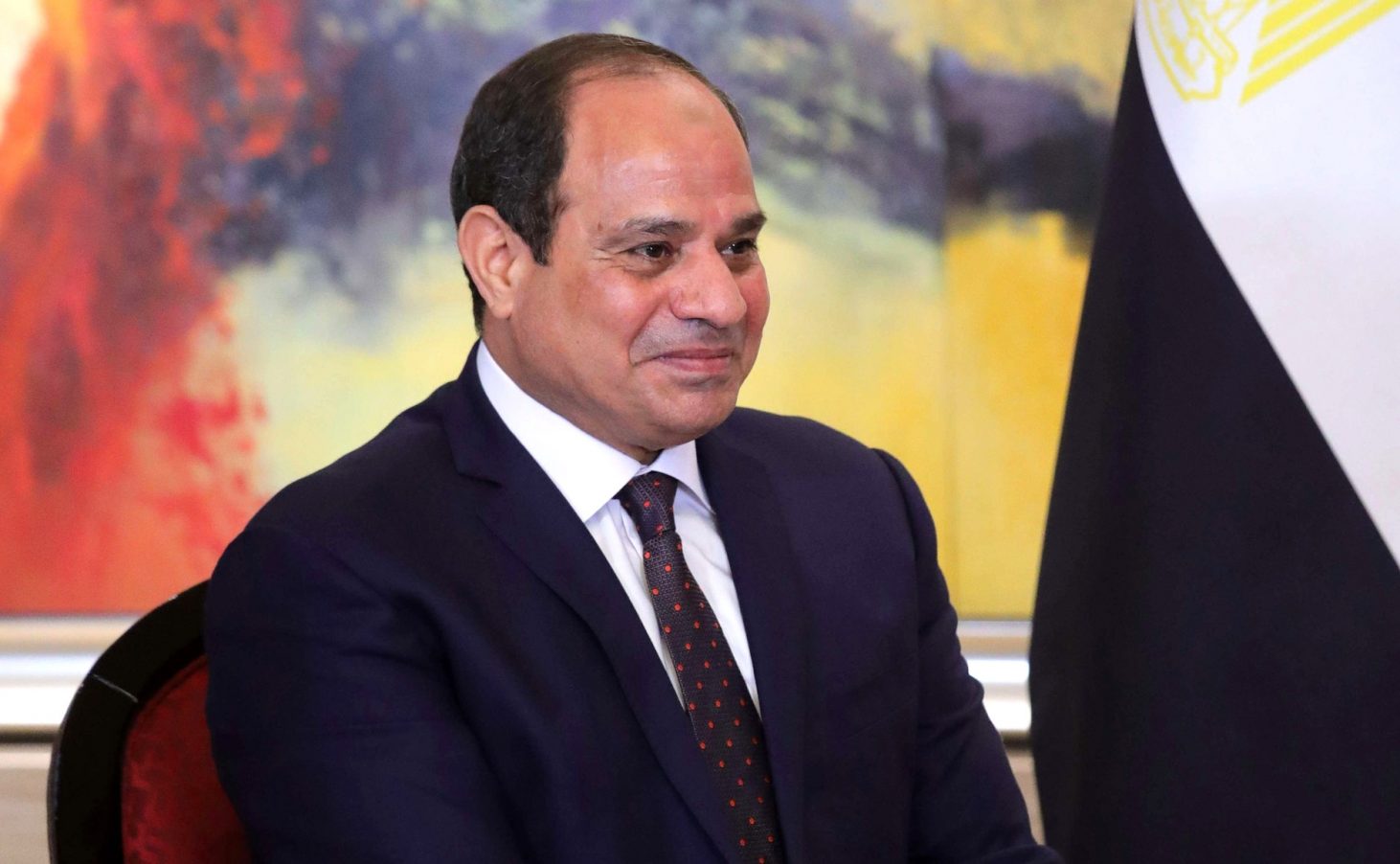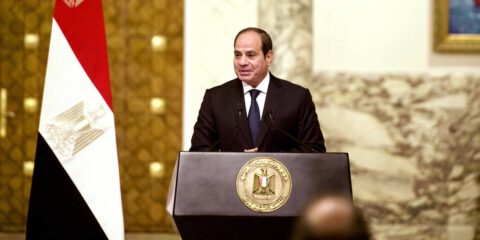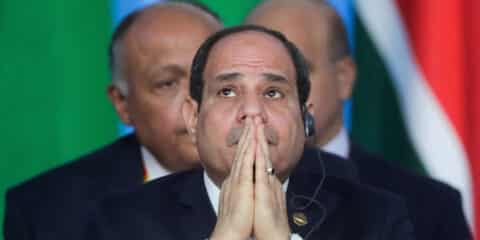Hopes and fears abound as President Sisi begins his second term. The winter of 2011 seemed to usher in a democratic spring. But the spring of 2018 seems to be authoritarian autumn.
President al-Sisi was recently re-elected in Egypt with 97% of the vote. Elections (if this is indeed the proper term) in which the incumbent president wins 97% are no cause for celebration. President Vladimir Putin, not suspected of harboring democratic tendencies, settled for much less than that.
As far as can be judged based upon the present governmental trajectory, little is left of the dreams, aspirations and ideas which at the time had brought masses of Egyptians, across the political spectrum, to Tahrir Square. The winter of 2011 seemed to usher in a democratic spring. But the spring of 2018 seems to be authoritarian autumn. It is important for Israel and her friends to take careful note of the implications of political realities in Egypt, for better and for worse.
The actual election results come as no surprise. The limitless horrors visited in recent years on Libya, Yemen, Iraq, and above all Syria, give weight to Sisi’s claim that his position and his authority are the last barrier against a disastrous Islamist takeover, or a catastrophic descent into bloody chaos. In such circumstances, it is to be doubted that Sisi’s second term, to which he has now been elected, will indeed be, as he had promised, also his last.
Presumably, the ugly manner in which Mubarak’s thirty years in power came to an end – having provoked the political call and movement “kifaya!”, enough! – should serve as a lesson to his successor. On the other hand, however, he now has in front of his eyes the model of China’s president, Xi Jinping, who just recently broke the “ten years rule” and apparently secured for himself, at the 19th party congress, one-man rule for the rest of his life.
From the point of view of Israel and of her partners in the struggle for stability and security in the Eastern Mediterranean – above all, Greece and Cyprus – this is not, in itself, bad news. All three welcomed the change of government in Egypt in 2013. They had good reason to worry about the entrenchment in power of the Muslim brotherhood, an entrenchment forcibly prevented by Sisi.
There are today patterns of cooperation between Israel and Egypt at the highest political level, in military and intelligence activities, and in the field of energy supply. The Egyptian regime’s war on terror is one of the keys to the future of the region as a whole. It is a struggle fought in the battlefield – against the so-called Sinai Province of the Islamic State – as well as in the realm of ideas.
Of great and abiding importance, despite limited results so far, has been Sisi’s call since January 2015, for what he defined as tas’hih al-khitab al-dini, reforming religious discourse, and ridding Islam of the policized radicalization which has plagued it for more than two hundred years, since the first Wahhabiyyah to this day.
Sisi also managed to prove, at some points during his first term of office, that he is able to translate his authoritarian rule, and the popularity he enjoys among broad segments of the Egyptian public, into hard decisions. This includes the reduction of the system of subsidies, which for decades has been distorting the basic features of the Egyptian economy.
He also demonstrated dynamism and effectiveness in promoting large scale projects, such as the doubling in size of the Suez Canal. On the agenda, now, is a massive plan, unprecedented since the days of the Mamluks, to move the capital from Cairo to a new city 40 kilometers to the east. This as yet unnamed city would have some seven million people, to be built largely by Chinese contractors. For China, which looks upon Egypt as a link in the chain of Xi’s Belt and Road Initiative, this would be one more step towards broadening her involvement in the region.
The president will need all of his leadership skills in handling the consequences of the future completion of the Ethiopian Renaissance Dam on the Blue Nile – which Egypt, despite some occasional war chatter, cannot prevent from being built. The anticipated change, over the space of some years, in the Egyptian management of water resources – a defining national issue – will require a change in ancient habits of consumption (and waste). Israel may be in a position, with the necessary sensitivity to Egyptian pride and acting behind the scenes, to be of help, given her own impressive achievements in the fields of preserving, recycling and desalinating water.
Facing a more immediate challenge, Egypt’s position is a major factor in the complex set of considerations shaping Hamas and PA leaders’ conduct in the ongoing political crisis in the Gaza Strip. The “March of Return” activities on the border fence are but part of this larger pattern. For Israel, there are benefits to be gained from Egypt’s ability to play a restraining role, while preserving her stand as one of the pillars of the “Camp of Stability” in the Arab world, alongside Saudi Arabia, most of the Gulf states, and Jordan; all of whom confront the activities of pro-brotherhood leaders in Turkey and Qatar, as well as the threats of Iranian hegemonism and Islamist terrorism.
Thus, from an Israeli point of view, Egypt’s stability is of supreme strategic importance. It may have become habitual to take this stability for granted, but if Egypt’s stability were to be undermined this would have far-reaching consequences, no less so than to the unresolved Palestinian issue or to the Iranian threat.
The importance of the stability of Egypt must continue to be a major theme in the ongoing efforts of Israel and her friends in Washington, as well as in European capitals. At the same time, highly discreet channels (given Egypt’s well known aversion to all criticism, external or internal) can perhaps be found to share with the Egyptian leadership the necessary warnings as to the weaker points in their policies.
Some such points are increasingly salient, despite the overwhelming election result – or because of it. The manner in which Sisi acted to prevent significant candidates from within the establishment, like former Chief of Staff Sami ‘Annan and former Air Force commander Ahamd Shafiq, from running against him does not indicate a sense of confident control of the public arena. It may point at worrisome personal cracks within the military elite.
The intensity of the repressive measures taken against the Muslim Brotherhood, and then against a range of elements within the political landscape and civil society since the bloody events of Rabi’ah al-‘Adawiyyah in the summer of 2013, may have gone too far. Some of the implications of these policies and practices came to light in the case of the death, apparently at the hands of the security forces, of an Italian student in January 2016. There may be some room for reminding the Egyptian leadership, quite carefully, that Israel’s ability to be of help – particularly in the halls of the US Congress – is hampered when the regime overplays its hand.
Meanwhile, as the recent terror attacks indicate (including the massive massacre of hundreds of civilians in November 2017, and the killing of 30 soldiers on April 15), the fighting in Sinai is being managed poorly and ineffectually. The US has made serious efforts to change these patterns, but even today – with Trump as a friend, unlike the manner in which they viewed the Obama administration – American messages are regarded with some suspicion.
In professional terms, Israel can render some professional advice. Within the obvious limits, the Egyptian military establishment should be advised (perhaps through a regional multi-party dialogue, including Jordan) to better adjust its fixated military traditions to the needs of a war against a ruthless challenger like IS and its offshoots. They should also be encouraged to be more forthcoming in their treatment of the Beduin population in Sinai.
Beyond that, a political system lacking checks and balances is likely to find it difficult, over the years, in properly reading social and economic realities. Even now it is possible to detect sharp differences in assessing the Egyptian economic situation between those who observe from with the existing system in Cairo and those professionals who watch this from outside. Sensitively and carefully, indirectly rather than frontally – possibly through an eastern Mediterranean dialogue between economic professionals in the relevant ministries and the central banks – Israel can be of help in offering feedback to the Sisi regime on the steps it is taking, or should take.
It is in Israel’s interest, and would continue to be in her interest for years to come, to be of help. The Egyptian economy cannot solve its basic problems. But at least it should be in a position to avoid further decline into crisis situations which could endanger political stability and send Egypt in the wrong direction in terms of her strategic orientation. The Israel-Egypt gas deal, side by side with the economic benefits it offers, should thus be seen as a useful tool in shoring up the bilateral relationship and in encouraging Egyptian economic growth.
JISS Policy Papers are published through the generosity of the Greg Rosshandler Family.
photo: By Official Internet Resources of the President of Russia [CC BY 4.0 ], via Wikimedia Commons







 - בניית אתרים
- בניית אתרים